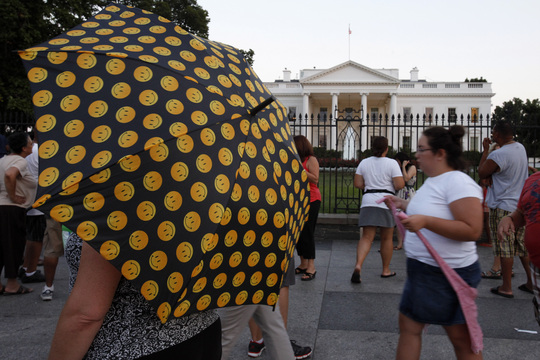What I learned on the way to the Revolution:
You can't always get what you want.
On Monday morning, I turned my "Pathways to
Peace" Disabled American Veterans calendar to August. The photo
was perfect for the month: mostly a cool green, with waterfalls
and sunlight falling onto a woodland pool that was surrounded by
moss-covered rocks.
Each month has an inspirational phrase.
August's is, "Taking this world as it is, not as I would have
it."
Thanks, veterans' calendar: a good reminder,
on the day of a historic vote on the national debt, which fully
pleased neither side of the debate, of the lessons I've learned
throughout my life about the world as it is.
One of my earliest memories: learning to walk
by holding onto a large, white, round hassock, working my way
around it. During one such stroll, my parents wanted to take my
picture, so they lifted me onto the hassock. I didn't want to be
lifted, didn't want to sit, so I cried; there's a photo of this,
of course.
You might say that I learned about the event
from the photo, but I remember what I was "thinking" at the
time, though I didn't yet have the words I needed, which
would have been "don't tell me what to do"! And so it began.
I wanted to do exactly what I wanted, and the
grown-ups were bigger than I was. Never really got over that
fact, continued to fairly cheerfully resent it onward to my own
grown-up resistance to Big Government, Big Business, Big Labor
and Big Church. Sometime in high school, I discovered Ralph
Waldo Emerson's essay "Self-reliance" and "Walden" by Henry
David Thoreau. My first year in college, I found the libertarian
movement.
Nothing like being a libertarian to fully
realize that you're not going to have things your way — not even
close. But sometimes you get it close enough; my life has been
as free as possible.
After two divorces, I realized I don't like
being married. I was shocked to learn, in the early '60s, that
marriage meant I couldn't hang out with my other guy friends
anymore. My wonderful husbands weren't possessive; it was the
other guys, who wouldn't invite me to play tennis or go sailing
unless the husband went along or gave his OK. Yikes!
| |
 |
| |
A woman holds a
smiley face umbrella outside the White House shortly
before President Barack Obama spoke last Sunday in
the White House briefing room about the debt
negotiations taking place on Capitol Hill. |
My son will tell you one of his toddler
memories was being told that mommy is a good sport about spilled
milk and other mishaps, but can't stand it when someone hangs
onto her leg and whines. He went through the rest of his
childhood not hanging, not whining; is still pretty good about
that and I'm sure his wife appreciates it.
Twelve years as a Catholic school student was
one endless "don't tell me what to do or think" argument with
long-suffering nuns and bemused priests.
Decided when I turned 18 that God wanted me
to be free to investigate other religions and choose my own.
When I put it that way, my long-suffering parents had to accept
it.
Politics was the tough nut to crack, though,
existing as it does to find ways to tell us all what to do.
Libertarians generally want maximum freedom, with fully
liberating personal responsibility; free markets; taxes used
only as user fees, with which we all pay our share of the
services we use.
Like liberals, we want peace; happy, well-fed
children; the elderly and sick attended; also "forever homes"
for every dog and cat. We urge good people to voluntarily choose
charities that will make this a better world, to put their own
money where their compassion takes them. For us, minimizing
freedom inevitably maximizes misery.
In a libertarian world, no one could initiate
force against others who haven't done so, thereby asking to be
stopped and controlled. Because they mostly see national defense
as primarily defensive, libertarians don't usually support
foreign wars.
This means that even if our own country
became libertarian, we still wouldn't have the world we want;
we'd like everyone to be as free as we are, but have to
recognize that we can't control other countries. Our forefathers
left them for a reason, one of which was wanting more freedom
than would ever be possible there.
So, you might ask, how can a libertarian be
happy with the bipartisan compromise resolution to the national
debt crisis, which leaves our Government very, very Big for the
foreseeable future?
Well, there are two kinds of libertarians:
those who never compromise, who insist on trying to create the
world they want and are willing to go down with their
ideological ship; and those who adjust to the world as it is,
and celebrate every little victory that moves us in the right
instead of the wrong direction.
The tea party also has these two divisions,
which we saw in this week's vote on the debt ceiling package:
unyielding idealists and pragmatists, arguing with each other
about strategy to change the world. I know how both of them
feel, and vote with the ones who take this world as it is.